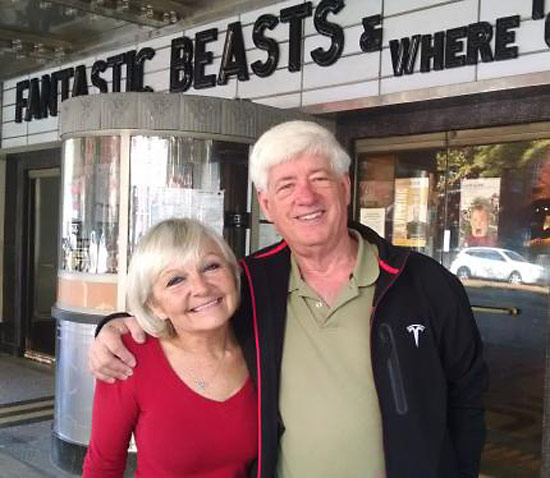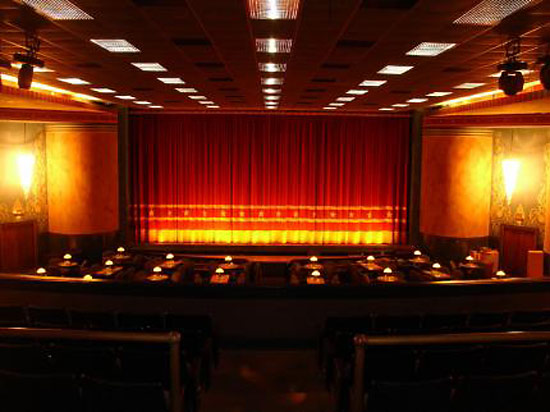THE COMMODORE THEATRE
A bit of true, Americana movie magic in the heart of Olde Towne
by Rob Lauer

Tiffany Brown and Fred Schoenfeld outside the beautiful Commodore Theatre
I didn't really care about history when I was young," Fred Schoenfeld recalls - an admission that might come as a shock to those who now know him as the owner and renovator of Commodore Theatre on High Street in the heart of Olde Towne Portsmouth.
"Later I did a complete 180, of course," Fred laughs. "I started to see how crazy it was that society was so willing to throw away anything old in favor of something new. We'll demolish a beautiful old building to build a parking garage. When that happens, I just want to shout: 'Stop! Put the bulldozer away!'"
Fred demonstrated that new mind-set nearly 30 years ago when he bought the then-dark and empty Commodore Theatre. Seated in the lobby of the now beautifully restored edifice, he joins his partner Tiffany Brown in remembering Commodore's past.

Commodore Theatre's red curtain has kept audiences captivated for almost 30 years - Photo courtesy Richard Long
"We started renovations in June of '87 with a projected cost of $350,000," Fred explains. "By the time we finished, we had spent $800,000. It was money well spent."
"Fred saw the restoration as an opportunity to excel," Tiffany adds. "To this day he regularly gets calls from people and organizations all over the country who have bought old movie palaces and want his advice on how to go about restoring them. Several times a year he's flying off somewhere to advise someone on how to restore a theatre."
"The Commodore was originally built in 1945 by Bunky Wilder, who owned a chain of theatres and drive-ins throughout the region," Fred says. "The Commodore was the flagship theatre of the Wilder chain. Because World War II was still being fought, the government had imposed rations on the use of certain metals and other materials that were deemed essential to the military.
"Wilder had to get permission from the government to use steel in construction of the building. Because of its proximity to the naval shipyard, the government decided that the theatre would be good for the morale of shipyard workers - so they gave Wilder permission to use steel. That was very unusual at the time."
Baltimore Architect John J. Zink designed the Commodore in the late art-deco style. The impressive construction details included walls that were 18 inches thick.
"Because of the walls' thickness, the theatre is soundproof," Fred points out. "We've had people come in to see a show and it's sunny outside; but when they go to leave, they see there's been a thunderstorm during the movie. 'We didn't hear a thing!' they say. This is the building you want to be in if a tornado ever hits the area," he adds with a laugh.
When Wilder sponsored a contest to find a name for his new theatre, one Portsmouth lady suggested that it be named after Commodore James C. Barron - a naval officer who served in the Barbary Wars and the War of 1812.
"It turns out that he's buried right next door at Trinity Episcopal Church - in the cemetery's only above-ground crypt," Fred explains.
"Movies are pure Americana -
a truly American form of entertainment.
Most people don't know that the
inventor and patent holder of the first
motion picture camera and projector
was Thomas Alva Edison."
- Fred Schoenfeld
While restoring the Commodore, Fred paid special attention to the two gigantic murals that adorn the expansive auditorium.
"One mural depicts our Tidewater identity," Fred reports; "the other depicts the history of the country up to the presidency of Harry Truman. James Nelson Johnson - a local artist from Virginia Beach - worked for two years on the restoration. Someone pointed out to him that there were no African-Americans in the original art work. So, James corrected that and re-painted the figure of the longshoreman as a black man. The restored murals look so much better than the originals. The quality of James' work was superior to that of the original artist."
Even though the restored Commodore Theatre was designated by the federal and state governments as a historic landmark, Fred was determined that audiences also have the best movie-going experience possible. With the help of George Lucas' THX Group at Lucas Film in California, Fred designed a sound system that he describes as top notch. "We're one of the few theatres in the country that's been THX Designated since 1990," he states proudly. "We're a first-run theatre that also offers dining."
When the Commodore first opened in 1945, dining was not on the menu. During the restoration, the main floor of the auditorium was redesigned to include tables - each with a small art-deco style lamp - on which the waitstaff could serve dinner. Besides traditional movie fare such as soft drinks and popcorn, guests can order from a dinner menu that includes pizzas, sandwiches, beer, wine, and much more.
"All of our food is prepared in-house," Tiffany, who oversees theatre operations, explains. "We like to say that we offer fine dining in a casual atmosphere. The entire experience here is unique. And there are so many little things that make us different from other movie theatres. For instance, we pop all of our popcorn in coconut oil and use real butter for flavoring."
For guests who aren't interested in dining, traditional stadium seating is available in the Commodore's expansive balcony area.
"Movies are pure Americana - a truly American form of entertainment," Fred boasts. "Most people don't know that the inventor and patent holder of the first motion picture camera and projector was Thomas Alva Edison. It's a shame that so many people download movies to their devices and watch them alone at home. They're missing out on one of the best parts of watching movies - coming together in one place with people that you don't know and then, during the course of the show, sharing in a single experience - watching a story and going through that emotional journey together. Watching a movie was meant to be a communal experience. Here we take that experience and we couple it with another communal experience: dining out."
While some dismiss movies as mere entertainment - something that's dispensable - Fred offers a more nuanced insight.
"Everyone needs chill-time," he says. "Time to be with loved ones; time to connect with another reality; time to recharge their batteries. Watching movies in the kind of venue they were meant to be seen in gives you that. Entertainment is a whole lot more important to our sense of well-being than we might think."
Commodore Theatre
421 High Street
Portsmouth, VA 23704
757-393-6962
http://www.commodoretheatre.com
